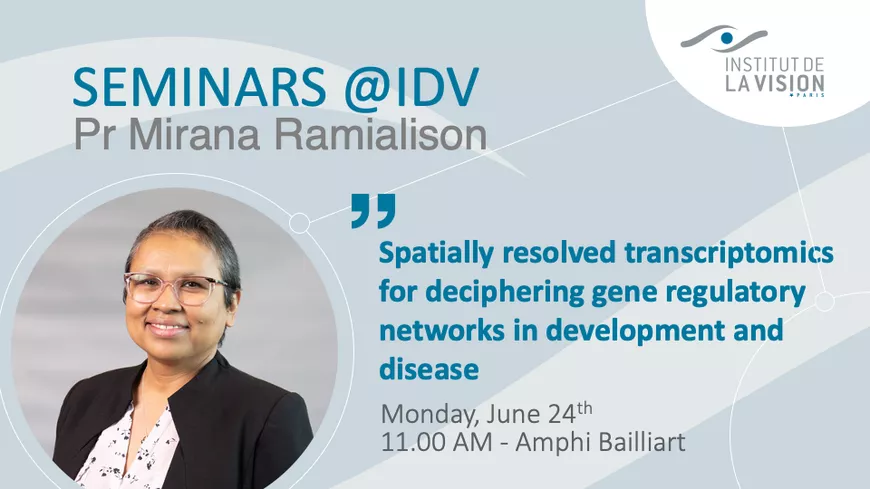Spatially Resolved Transcriptomics For Deciphering Gene Regulatory Networks in Development and Disease
Invited by Filippo Del Bene, Pr Mirana Ramialison (Murdoch Children's Research Institute and Fondation Novo Nordisk, Melbourne, Australia) will give a speech on June, Monday 24th at 11.00 AM. Meet in Amphithéâtre Bailliart, 3rd floor of the Hôpital national des 15-20.

Our team has a long-standing interest in identifying the specific gene sets required for the formation of a healthy embryo, based on the principle that perturbations in these genes will impair normal development, resulting in anatomical defects. Thousands of genes are expressed in any given organ at any given time point during development, but which of these genes are critical for organ-specific formation and play a significant role in congenital defects?
To address this, we used a battery of spatially resolved transcriptome-based technologies ranging from spatial RNA-sequencing, Tomo-seq, Visium Spatial Transcriptomics and ST-Omics to unravel novel spatial determinants for organ development and disease. We generated the first spatially resolved map of the murine heart (https://3d-cardiomics.erc.monash.edu/) and identified synexpression groups expressed in distinct regions of the heart, which revealed novel anatomical domains of co-ordinated expression.
Here I will describe our spatial journey from surprising insights in benchmarking of emerging tools for spatial transcriptomics data analysis, mining spatial transcriptomics data in the context of childhood disease to developing visualisation tools for spatial data in virtual reality using our software VR-Omics (https://ramialison-lab.github.io/pages/vromics.html). Altogether, these pipelines allow to unbiasedly uncover novel genetic determinants of the developmental gene regulatory networks, and help understand the aetiology of congenital diseases.
About Mirana Ramialison
Associate Professor Mirana Ramialison is Group Leader of the Bioinformatics and Transcriptomics Laboratory at the Murdoch Children’s Research Institute in Melbourne, and heads the reNEW Bioinformatics Hub of the Novo Nordisk Foundation for Stem Cell Medicine. A/Prof Ramialison received her Engineering degree from the University of Luminy, after which she worked as a programmer at the ERATO differentiation project in Kyoto. She obtained her PhD from the European Molecular Biology Laboratory in Heidelberg in 2007, and joined the Victor Chang Cardiac Research Institute in Sydney as an EMBO and HFSP Post-Doctoral Fellow in 2010. As an NHMRC/Heart Foundation Career Development Fellow, she established her first laboratory at the Australian Regenerative Medicine Institute (Monash University) in 2014. She is currently a Heart Foundation Future Leader Fellow, winner of the 2023 Shirley E Freeman Innovation Award.
